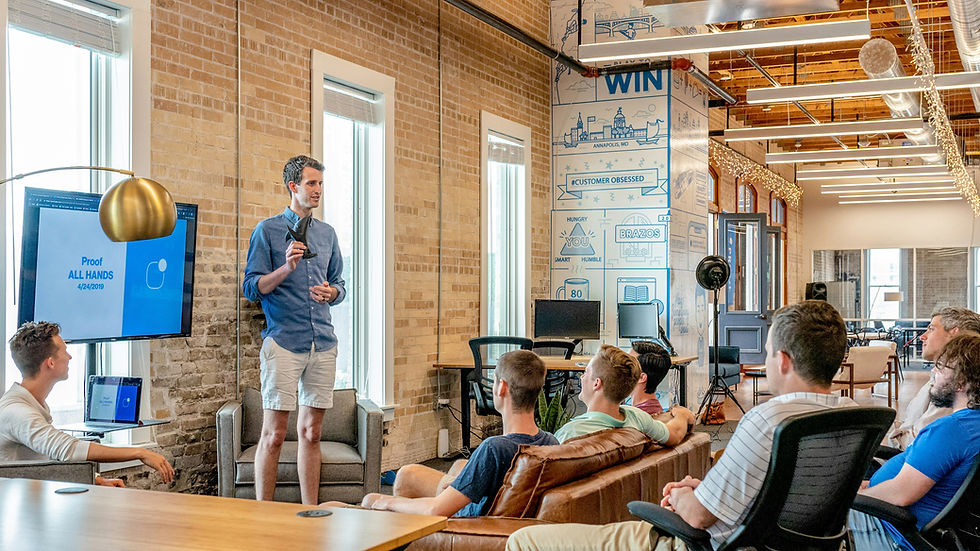Unlocking the Power of Lifelong Learning in Facilities Management: Strategies for Professional Development
- Maxcene Crowe

- Oct 13, 2024
- 3 min read
Updated: Apr 16
Staying ahead is not just crucial; it is essential for success. With new technologies, regulations, and sustainability practices emerging regularly, professionals in this field must continually learn and grow. Lifelong learning enhances your skills, elevates service quality, and drives efficiency. This blog post explores strategic ways to foster a culture of continuous learning in facilities management, benefiting both individuals and the organisation as a whole.

Offer Flexible Learning Options
Creating an environment that promotes lifelong learning starts with providing flexible and varied learning options. Accessibility encourages participation and enhances engagement among facilities management professionals.
One effective approach is to leverage digital learning platforms like our Academy www.mcfmgacademy.com. According to a report by Deloitte, 70% of employees prefer to learn at their own pace. E-learning modules, webinars, microlearning, and on-demand courses allow employees to learn when it suits them best. These formats reduce the need for in-person attendance and empower learners to focus on topics that resonate with their interests and job roles.
Moreover, utilising microlearning modules can significantly improve the learning experience. These short sessions target specific facilities management topics. For instance, a microlearning module focused on energy-saving tips can lead to a 20% reduction in energy bills, demonstrating the practical benefits of focused learning. This method makes it easier for busy professionals like you to integrate learning into your schedules without feeling overwhelmed.

Additionally, mobile learning apps are an essential tool for accessibility. Employees can access educational content anytime and anywhere, simplifying learning integration into daily life. Whether they are commuting or taking short breaks, FM professionals can easily stay updated on industry trends and best practices. A 2021 survey revealed that 52% of employees stated they would be more likely to engage in training if it were accessible on their mobile devices.
Provide Incentives for Ongoing Development
While accessibility is vital, organisations must also implement a framework that motivates lifelong learning through tangible rewards. Encouraging professionals to participate in training should align with their career goals and personal aspirations.
One effective strategy is to develop recognition programs for employees who proactively seek new knowledge. Public acknowledgment in team meetings or newsletters can boost morale and highlight the importance of continuous learning. A 2020 study found that companies with strong recognition programs saw a 31% decrease in employee turnover.
Offering financial support for education is another compelling way to maintain momentum in professional development. Investing in certifications, workshops, or conferences related to facilities management shows a commitment to employee growth. For example, sponsoring an employee for a certification like our (CPD Accredited courses) can lead to improved team performance by up to 25%, illustrating the value of investment in employee education.
Furthermore, organisations should consider creating clear career pathways that delineate necessary skills and competencies for advancement. For instance, a facilities manager may need expertise in project management, energy efficiency, and compliance to move to a senior management position. By clearly outlining these skills, FM professionals can strategically plan their learning journeys, aligning personal development with organisational needs.

Cultivating a Culture Focused on Improvement
Establishing a culture that values lifelong learning hinges on leadership's genuine commitment to continuous improvement. Leaders should actively promote the idea of ongoing education and skill enhancement as integral to the organisation's values.
Additionally, educational programs must be regularly evaluated and updated based on current industry trends and employee feedback. Engaging FM professionals in this assessment can foster a sense of ownership and commitment, ensuring that learning opportunities remain relevant and effective.
Encouraging collaboration and knowledge sharing also contributes to a culture of improvement. Mentorship programs provide a structured way for experienced professionals to guide newcomers. This system creates an environment where questions and best practices can be shared freely, promoting a supportive community and a robust learning atmosphere.
Final Thoughts
Emphasising lifelong learning in facilities management is essential for both individual skill advancement and organisational success. By providing flexible learning opportunities, incentivising ongoing development, and fostering a culture of improvement, organisations can cultivate an environment that nurtures growth.
As the facilities management sector evolves, continuous improvement and upskilling will play a crucial role. Empowering employees with effective learning strategies unlocks their true potential and ensures they are equipped to face future challenges. In a dynamic field like this, embracing lifelong learning is a necessity—not merely an option. Implementing these proven strategies helps organisations not just adapt to changes in the industry but also lead the way forward for a transformative future.
.png)



Comments